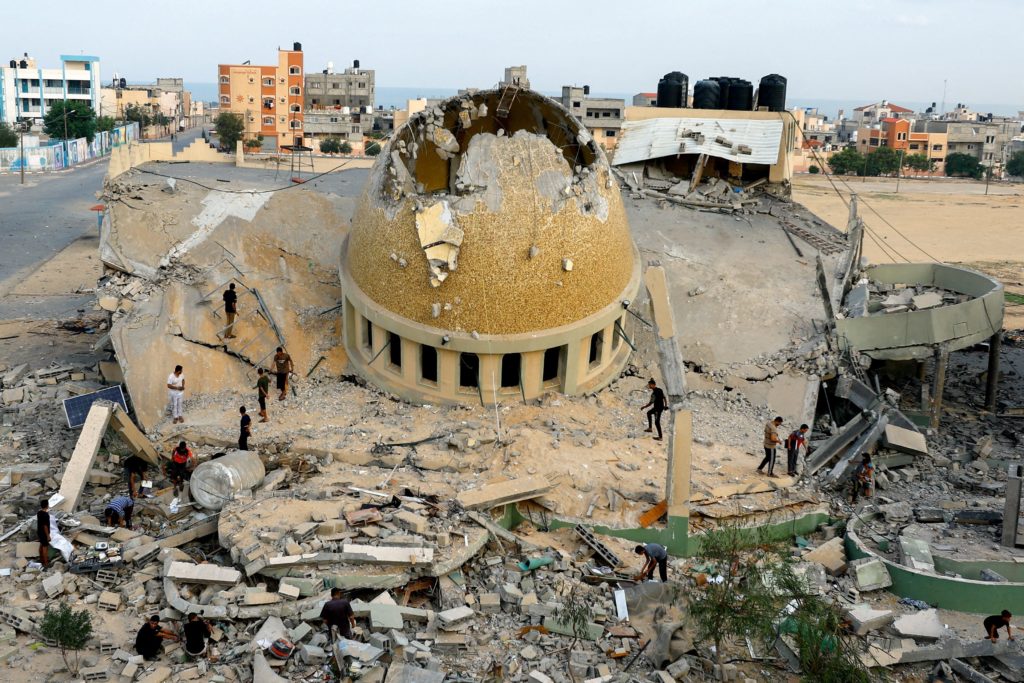While the increasing polarization in our country is nothing new, we seem to be heading into a category 5 hurricane of hostility this year. Not only is it an election year, but it’s a reprise of 2020. In addition, we are divided over the Israel-Hamas war and the Ukraine-Russia war. We have dueling apocalyptic visions, whether it’s the death of democracy or the unwashed hordes invading our southern border.
Our Church has its own share of divisions as well, where even the pope has become a catalyst of polarization.
And while our communities, our parishes, our states are becoming increasingly ideologically homogeneous, the breadth and depth of our polarization is touching us even if we seek solace among people who resemble us in our beliefs and biases.
The personal risks and costs of our divide have come home to me recently. A close friend of mine is Jewish. We bonded over my interest in Judaism, his interest in Catholicism and our resulting comfort with each other’s “tribe.”
That is until Oct. 7 and its aftermath. The horror we both felt over the Hamas massacre and hostage taking was shared, if not equal. After all, for him it was much more personal, one of a chain of massacres extending back through history and up to and including the Nazis’ “Final Solution.”
It was not the reaction to the massacre that was troubling us, but the reaction to Israel’s reaction. Over the weeks and months, the images and reports of Gaza’s destruction troubled me more. Our conversations became perhaps a bit more guarded. At one point, he said he hoped that our disagreement would not hurt our friendship, and I assured him it would not.
And it will not.
But not a lot of people share my certitude when it comes to such disagreement, which is why we are seeing a cottage industry of books aimed at addressing ways to diagnose and overcome polarization. Titles like “I Think You’re Wrong (But I’m Listening),” “Why We’re Polarized,” “Uncivil Agreement,” “Steps to Positive Political Dialogue,” and more.
One that seeks to challenge us as Catholics is Father Aaron Wessman’s “The Church’s Mission in a Polarized World” (New City Press, $14.99). Wessman looks at the data around polarization, and what he finds is alarming. By nearly every metric, things have gone from bad to worse in recent years. Not only do we not like the people we disagree with, we increasingly view them as a mortal threat. Indeed, Wessman explores how our language of war and violence is used to describe our opponents. We don’t need to just defeat them at the ballot box. We need to crush them. We apply labels like MAGA, Communist, and even vermin, all ways to degrade and dehumanize.
Wessman and others have reported that Catholics increasingly identify more with their party than their Church. In fact, religious belief is less and less seen as a source of guidance. Fewer Christians are going to church regularly or reading Scripture.
The question Wessman asks is this: “Does my relationship with Jesus, and the tradition given to me through the Scriptures, along with the teachings of the Church, inform my life more than the political party to which I belong?”
The fact that many Americans today would be more bothered if their child married someone from the opposite political party than a different church may tell us the answer.
For Wessman, our challenge as Catholics is to rediscover the person on the other side of the divide. Because we are called to love our enemy, not to mention our fellow citizens and our fellow parishioners, the solution is not war, nor avoidance, but to “cross over,” to engage “the other.”
“When one chooses to encounter the other, the likelihood of seeing the person who espouses the idea, and not just the idea that one disagrees with, becomes more likely,” Wessman writes.
“For Christians, crossing over is not really an option: It is essential to a life of missionary discipleship,” he adds.
This is hard stuff. It can end badly, both because the “other side” may not respond well to our efforts, and because our own “side” may not either. Our faith does call us at this time to be “strangers in a strange land.”
But when I think of my Jewish friend, I realize that two essential ingredients are trust and time. Getting to know each other in small conversations and big, over meals or shared projects, the person becomes more essential than the position.
All those books about polarization give me hope. Organizations that are working to connect us one by one do as well. This fever of mutual fear and loathing will surely break. But that calm after the storm can only happen when we make the first move.

